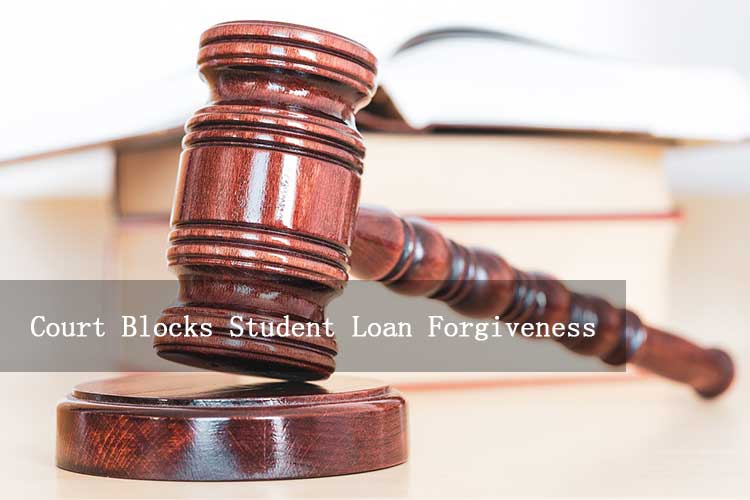
A major legal decision has just put a stop to student loan forgiveness programs that numerous borrowers were relying on. This ruling has sparked a lot of uncertainty and worry for those looking for relief from their student loans. In this article, court blocks student loan forgiveness, we’ll delve into the specifics of the ruling, its impact on borrowers, and what you should be aware of as you move ahead.
Overview of the court blocks student loan forgiveness
In August 2024,a federal court ruled against key student loan forgiveness programs proposed by the Biden administration. These initiatives aimed to relieve the financial burden on millions of borrowers, especially those facing economic hardship or working in public service.
The court’s decision followed challenges from various parties, including state governments, who argued that the administration exceeded its authority. This ruling raises significant questions about the legality of future forgiveness programs.
Reasons Behind the Block
The court’s ruling was mainly based on how existing laws are interpreted and the limits of executive authority. Opponents of the loan forgiveness initiative claimed that the Biden administration exceeded its powers by trying to eliminate significant amounts of student debt without the approval of Congress. They argued that this could create a troubling precedent, jeopardizing the legislative process.
The judges highlighted the absence of explicit congressional authorization for broad student loan forgiveness. They underscored the necessity of adhering to existing legal standards. This ruling illustrates the continuing discussion regarding the federal government’s involvement in handling student debt. It also prompts inquiries about the extent of the government’s impact on the financial circumstances of borrowers.
Impact on Borrowers
The recent ruling has immediate and extensive consequences for millions of borrowers who were relying on loan forgiveness. Here are some important effects:
- Missed Forgiveness Chances: Many borrowers, particularly those with federal loans, were looking forward to relief through various programs, such as the Public Service Loan Forgiveness (PSLF) program. The court’s ruling puts a stop to these efforts, leaving many without the assistance they were counting on.
- Heightened Financial Strain: With the chance of forgiveness now off the table, borrowers will have to manage their entire student loan amounts, which can create a heavy financial load. This is particularly challenging for those who have faced difficulties during the pandemic or are currently experiencing economic struggles.
- Confusion Over Repayment Options: The ruling introduces uncertainty regarding current repayment plans and their potential future impacts. Borrowers might find themselves unsure about whether to stick with their existing repayment methods or consider other options.
Current Status of Loan Forgiveness Programs
Currently, the court’s decision has paused several loan forgiveness programs. This affects the following:
- Public Service Loan Forgiveness (PSLF): The PSLF program, which grants loan forgiveness to individuals in public service roles after they make 120 qualifying payments, is significantly affected. While some borrowers might still qualify under existing guidelines, new applicants will encounter increased uncertainty.
- Income-Driven Repayment (IDR) Forgiveness: For those on income-driven repayment plans, there is a possibility of having their remaining loan balance forgiven after 20 or 25 years of qualifying payments. The court’s ruling complicates the rollout of reforms aimed at simplifying and improving these forgiveness options.
- For-Profit College Borrowers: Borrowers from for-profit colleges, which have faced criticism for high default rates and unsatisfactory outcomes, were looking forward to relief through specific forgiveness programs. This ruling may obstruct efforts to provide the necessary assistance to these borrowers.
Next Steps for Borrowers
If the court’s decision impacts you, here are a few actions you can consider:
- Stay Updated: Make sure to follow any news regarding the ruling and updates from the Department of Education. Being aware of your rights and the current situation of your loans is crucial.
- Look into Different Repayment Plans: If your student loan payments are becoming too much to handle, think about looking into different repayment options. Income-driven repayment plans can provide relief by adjusting your payments according to your income.
- Consider Consolidation or Refinancing: For certain borrowers, consolidating or refinancing loans could be a good choice. This might help reduce your interest rate or make your repayment process easier. However, it’s important to consider the advantages and disadvantages thoroughly, as refinancing federal loans might mean giving up some protections and benefits.
- Seek Financial Counseling: If you’re having a tough time managing your student loans, it might be a good idea to connect with a financial counselor or advisor who focuses on student debt. They can assist you in examining your choices and creating a tailored repayment plan.(Firstmark services student loans)
Potential for Appeals or Changes
The court’s decision to block student loan forgiveness has created a dynamic legal situation. Here are some potential developments:
- Appeals Process: The Biden administration might decide to appeal the ruling, looking for a higher court to step in. This could result in a lengthy legal struggle, potentially postponing any forgiveness efforts even further.
- Legislative Action: There could be a movement towards new legislation designed to assist student borrowers. Advocates are urging Congress to take steps to pass new laws that would enable forgiveness or adjust current programs.
- Future Policy Changes: Even if the existing forgiveness initiatives are halted, there may still be chances for reform down the line. Policymakers might explore alternative strategies to tackle the student debt crisis, such as targeted forgiveness for certain groups of borrowers or enhanced repayment options.
Resources for Borrowers
If you need help or more details about student loans, check out these helpful resources:
- Federal Student Aid (FSA): The Federal Student Aid website, managed by the U.S. Department of Education, is an excellent source for information on federal student loans, repayment options, and forgiveness programs.
- Student Loan Ombudsman: The Federal Student Aid Ombudsman is available to assist you with any issues related to your student loans. They can help resolve disputes and guide you through the loan process.
- Nonprofit Organizations: Groups like the Student Debt Crisis Center and the National Consumer Law Center offer resources, advocacy, and support for borrowers who are facing difficulties with their student loans.
- Financial Advisors: Working with a financial advisor who focuses on student loans can help you develop personalized strategies that fit your needs, enabling you to make well-informed choices.
Conclusion
The recent ruling that court blocks student loan forgiveness has left many borrowers facing uncertainty and financial strain.It’s important for borrowers to keep an eye on the evolving landscape of forgiveness programs, as their future is still unclear. Consider looking into various repayment options and don’t hesitate to ask for assistance if necessary. Take charge of your student loan situation and make the most of the resources at your disposal to help you through this tough period.With the right mindset, you can still strive for a more manageable financial future, despite these challenges.



